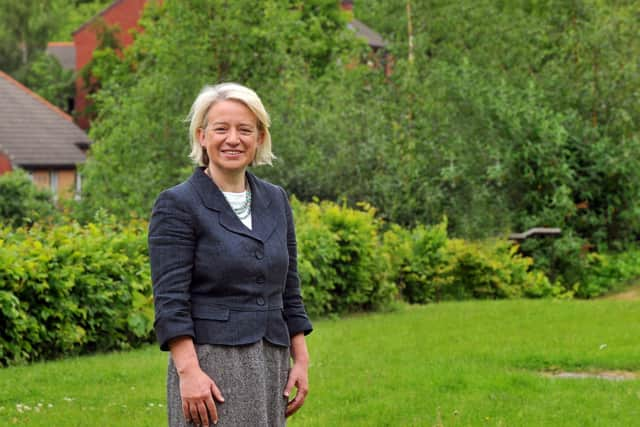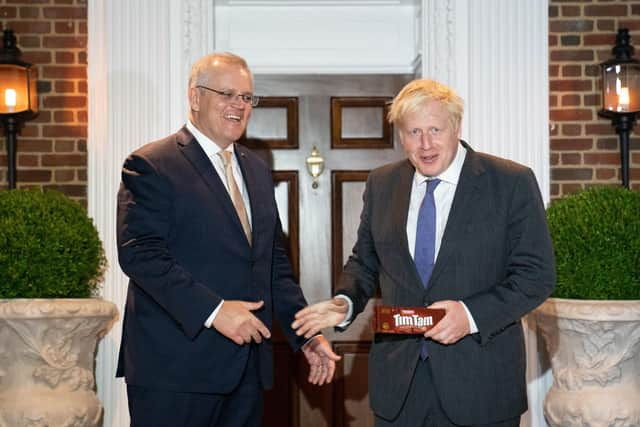Why AUKUS nuclear pact betrays environmental goals – Natalie Bennett


My native Australia, however, leapt right in, despite considerable domestic resistance, heavily influenced by the then-prevalent “domino theory”, that if Saigon fell, communism would tumble south through South East Asia and eventually reach its shores.
The domino theory might not be talked about any more, but the creation of AUKUS – a new tri-lateral defence partnership between the US, UK and Australia that will involve the handing to the antipodean state nuclear-powered submarines – is a rerun. The pact is clearly aimed at the economically resurgent, diplomatically assertive Chinese state.
Advertisement
Hide AdAdvertisement
Hide AdIn the House of Lords much of the reaction sounded like it came from the last century, with the official Labour and Liberal Democrat speeches in particular focusing on the potential for the creation of British jobs. Yet it struck me how out of sync this was with other headlines of September 2021. A cry “we must have jobs” as a driving force for foreign and defence policy – a decision that has provoked, from neighbours and rivals alike, cries of horror, and grave concerns from the experts about the dangers of fuelling nuclear proliferation.


Recently I was in successive events with the construction industry and the food and farming sectors, both lamenting the huge shortages of workers that they face. The shortage of HGV drivers is painfully evident on our supermarket shelves, the crisis in care homes a massive issue of life and death significance.
And there’s another disjunction, not just with the headlines, but the Government’s own words, that I chose to highlight in the one question space allotted to me.
The Government’s Integrated Review of Defence, Security, Development and Foreign Policy identifies the climate emergency and nature crisis as its number one international priority.
Advertisement
Hide AdAdvertisement
Hide AdIts own statement on AUKUS acknowledged that handing over nuclear submarines is “a decision of the utmost gravity, requiring perhaps the closest relationship of trust”. Yet the Climate Transparency Report on G20 countries ranked Australia in the bottom bracket of every climate action area, except one.


The report says that the Morrison government in Canberra has no national plans to expand renewable energy, phase out coal, phase out fossil fuel vehicles, retrofit buildings or reduce deforestation.
I had to ask: How can the UK trust such a criminally negligent, environmentally destructive state, given our stated top international priority and our position as the chair of COP international climate talks?
We are now in a climate emergency and nature crisis. We have a desperate shortage of skills, and workers, to tackle that. Last weekend at the How the Light Gets In festival I sat beside an eco-builder, a small businessman lamenting the extreme limitation of our technical training, colleges having been eviscerated by a decade of austerity stacked on top of long-term under-investment.
Advertisement
Hide AdAdvertisement
Hide AdThe Government’s flagship £1.5bn Green Homes Grant collapsed in ignominious confusion in large part due to the lack of skills available to deliver it.
When the House returns we’ll be in the Report stage of the Skills and Post-16 Education Bill, attempting to tackle to the grave shortage of technical skills needed for the existential issue facing us.
Aside from the big questions of diplomacy and the dangers of escalating international tensions, we must acknowledge that in an ageing, under-trained and educated society, we can’t afford to use scarce, valuable, hi-tech skills wastefully, let alone dangerously.
A designer working on a nuclear submarine is not drafting up new ways to balance the smart grid. An engineer planning for the construction of a submarine hull is not paving the wave for tidal power. The machinist turning the parts for this boat is working up concentrated solar power for specialist applications.
Advertisement
Hide AdAdvertisement
Hide AdWe’re just starting to rethink many aspects of our workforce arrangements, to acknowledge that care workers are skilled, especially valuable, employees who need to be far better paid and respected. HGV drivers likewise.
And to start to acknowledge that learning and training must be lifelong, flexible, encouraging creativity and inventiveness, with a foundation of learning to learn, rather than learning to pass exams.
But we also need to fundamentally reshape our thinking – a development that debate around AUKUS demonstrates has barely started.
Human resources are precious, and scarce. To get through the crises we now face, they must be cultivated, valued and put to good use.
Advertisement
Hide AdAdvertisement
Hide AdBaroness Bennett of Manor Castle is a Green Party peer and former party leader. She lives in Sheffield.
Support The Yorkshire Post and become a subscriber today. Your subscription will help us to continue to bring quality news to the people of Yorkshire. In return, you’ll see fewer ads on site, get free access to our app and receive exclusive members-only offers. Click here to subscribe.
Comment Guidelines
National World encourages reader discussion on our stories. User feedback, insights and back-and-forth exchanges add a rich layer of context to reporting. Please review our Community Guidelines before commenting.